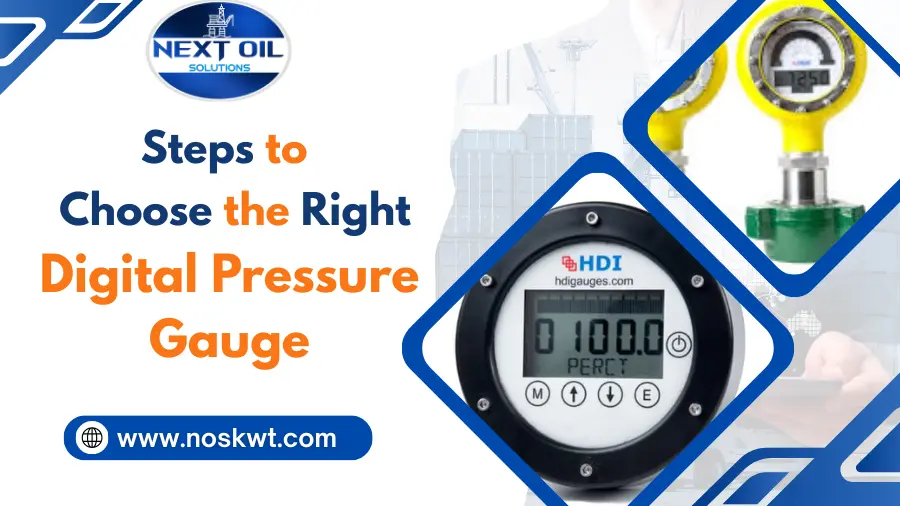
Steps to Choose the Right Digital Pressure Gauge
Accurate pressure measurement is necessary for safe operations in most industrial, mechanical, and oil-related applications. Precise readings make sure the operations are handled smoothly and help avoid hazardous situations. Without accurate pressure measurement, the risk for failures and accidents increases. However, by selecting the right digital pressure gauge, you can timely detect abnormal pressure changes and avoid potential hazards and accidents.
By detecting issues early, businesses don’t need to spend on costly repairs and replacements due to equipment failure. Choosing the right pressure gauge can help you secure the highest level of safety, productivity, and reliable performance. Keep reading to find out the steps for selecting a digital pressure gauge for safer business operations.
What is a Digital Pressure Gauge?
A digital pressure gauge gives correct pressure values using electronic sensors. These don’t rely on mechanical components like analog gauges. They have a transducer that changes the measured pressure value of liquids and gases into a clear digital output. These offer higher accuracy and easier readability with additional features.
In simpler words, these gauges use electronic pressure sensors that convert force applied by a fluid or gas into an electrical signal. The system changes the signal into numbers that are shown on a digital screen. Even in dark settings, the digital display makes it simple to read the pressure value.

How to Select the Right Digital Pressure Gauge
Digital pressure gauges provide more accurate readings than analog ones because they don’t depend on mechanical parts that can be easily damaged. These gauges provide reliable pressure readings and need minimal maintenance. Here are the key steps to help you select a perfect pressure gauge:
1. Accuracy
Accuracy is one of the most significant factors that make digital gauges a better option than mechanical gauges. Detect the level of error that is acceptable for your operations. You also need to check the accuracy class and readability of the scale. Generally, gauges with higher accuracy are more expensive. So, you need to figure out the acceptable range of error for your process and then make a final decision.
2. Pressure Range
Detect the maximum and minimum pressure your application will experience. This will help you choose a pressure gauge with the needed range. It is crucial to invest in a gauge that satisfies your requirements for the required pressure gauge and also has enough overload safety. This will help in avoiding any damage to the equipment and make sure you don’t obtain false pressure readings.
3. Connection Type & Mounting Style
Another thing to make sure of when selecting the right digital pressure gauge is that the connection of the gauge must match your system so that it fits correctly. Gauges are available in various connection types, like NPT, DIN, BSP, and others. You also need to consider choosing one with the right mounting style, like direct, panel, or remote. This will make sure the gauge fits the available space.
4. Environmental Conditions
Pressure gauges are generally used in environments with particular temperature, humidity, and potential exposure to chemicals. First, you need to decide where you’ll install the digital pressure gauge and then how you will use it. After determining this, note the surrounding environmental factors and choose a gauge that can handle those conditions without problems. Generally, liquid-filled gauges are preferred for harsh environments due to their vibration reduction or absorption capabilities.
5. Dial Size & Readability
Easy readability is another main reason digital pressure gauges are preferred over mechanical or analog gauges. They have a display that displays readings easily, even in a dark environment. You also need to select a gauge with the right dial size and spacing between scale divisions. The readings must be visible and easily readable from different angles.
6. Durability
Apart from readability, the environmental conditions, and accuracy, durability is an important point to consider when choosing the right digital pressure gauge. They lack moving parts, so they are generally durable. You need to identify the kind of durability you need, depending on your applications. Consider its overall construction, like the housing and sealing of connections, to make sure it can easily handle vibrations and impacts.
7. Process Media Compatibility
The pressure sensor installed in a digital pressure gauge is made of different materials. You need to make sure the parts of the gauge that come into contact with the measurable fluid are made of materials compatible with the process media and the surrounding environment. If there are incompatibility issues, the risk of corrosion and damage will increase. So, before purchasing a pressure gauge, make sure to check its compatibility with the process media.
Make the Best Choice for Your Pressure Measurement Needs
Choosing the right digital pressure gauge helps with safer operations by providing accurate readings. It also helps in detecting unusual pressure changes in advance, reducing the risk of damage and costly repairs. At Next Oil Solutions, a reliable supplier of digital pressure gauges, you’ll always get the best gauge based on your pressure measurement needs.
We provide high-quality gauges sourced from trusted manufacturers to make sure our clients get the right solutions. Our team also provides support to clients in choosing the perfect digital pressure gauge based on their needs. We offer solutions that match the relevant industry standards and also offer after-sales services.
Also Read: A Complete Buyer’s Guide to Hydraulic Cable Cutters
